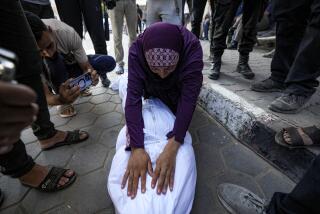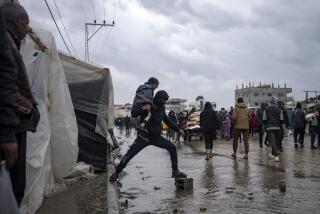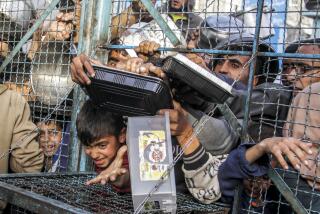Assault Leaves Camp Cut Off From Aid
SALEM, Israel — On a ridge along the Green Line between Israel and the West Bank, a small crowd of Palestinians gathered in a dusty parking lot Wednesday to plot a clandestine mission.
They were waiting for Israeli soldiers, who were patrolling the line within earshot, to move on so they could sneak three truckloads of food, clothing, medicine and mattresses over dirt roads to thousands of Palestinians from the shellshocked refugee camp outside Jenin.
The Israeli army’s weeklong tank and helicopter assault on armed militants in the refugee camp seven miles from here, the deadliest battle of its 13-day-old West Bank offensive, is all but over. But the struggle to help the survivors and count the dead--feared to number in the hundreds--is just beginning.
On one side are international and Palestinian relief organizations, plus foreign journalists trying to report the battle’s scale. On the other side is the Israeli army, which a week ago declared the area a “closed military zone” and was still on a war footing Wednesday.
In the middle are 12,000 camp dwellers, the bulk of them now homeless and an undetermined number of them wounded. The camp was first settled by refugees from past Middle East wars who are now on the move again, seeking shelter elsewhere.
“We are having to smuggle supplies to those people, because it seems that the Israelis don’t want them to get it,” said Younis Younis, 33, an Israeli Arab computer engineer who was helping to coordinate the relief effort in the parking lot of this Israeli Arab village. “The Israelis are trying to punish our people.”
Israel says it launched the campaign to end a wave of suicide bombings that has terrified the nation.
Volunteers unloaded bundles from pickup trucks so they could be hauled in smaller, less conspicuous tractor-drawn carts over the rugged terrain of the open valley below. The destination was Rummaneh, a village between here and Jenin where more than 600 people from the refugee camp have arrived this week.
From the ridge, the distant battle appeared to be over.
In the past week, Israeli tanks and helicopter gunships have pummeled the camp, overwhelming the fiercest resistance to Israel’s offensive. The camp was a densely packed settlement whose residents included hundreds of armed Palestinian militants and many suicide bombers.
The resistance collapsed Wednesday, a day after the militants’ deadliest strike--an explosion that killed 13 Israeli soldiers in one of the camp’s narrow alleys. About 300 residents surrendered, and Mahmoud Tawalbeh, a 23-year-old leader of the Islamic Jihad group who masterminded a number of suicide bombings, lay dead in the street.
Most journalists trying to reach Jenin and the camp were barred by Israeli soldiers at several checkpoints. An Associated Press photographer who managed to drive through the camp Wednesday found the streets deserted. He said he saw many building facades with wrecking-ball-sized holes from Israeli shelling.
Where the helicopters and tanks left off, the bulldozers took over. Abu Rashid said he saw at least five bulldozers swing into action around midday, knocking down the remains of damaged homes and opening wide, dusty avenues between those left standing.
Palestinian sources said the death toll in the camp could exceed that for all other parts of the West Bank since the offensive began. The Palestinian Red Crescent said 128 Palestinians had been killed so far in the offensive; the Israeli army put the number at 200 Palestinians.
“In Jenin, people talked about 500 people killed in the camp,” said Bertrand Bainvel, UNICEF’s coordinator in the Palestinian territories. “I can’t tell you whether it’s reliable or not.”
Thousands have fled. Fatih Zakarneh, a doctor at Amal hospital in Jenin, said about 2,000 people had passed by his hospital in search of shelter in the last three days. But people have also left the camp in other directions.
Scores of fighting-age men from the camp, rounded up by the army and freed after security checks, have been banished from greater Jenin until the occupation is over. The army has trucked many of them to Rummaneh and another village, Zbouba.
Efforts to get relief to those in Jenin or still trapped in the camp have been harrowing.
It took the International Committee of the Red Cross six hours to manage the evacuation Monday of three seriously wounded people from the camp because Israeli soldiers stopped the ambulances at each checkpoint and forced their Palestinian drivers to lie on the ground.
That evening, the Red Cross succeeded in arranging a cease-fire agreement with the Israeli civil administration in the West Bank so ambulances could bring out a larger number of wounded the next day. But when Red Cross delegates arrived Tuesday morning, the Israeli army refused to let the ambulances enter the camp or the city, an agency spokeswoman said.
No ambulances even tried to get to Jenin on Wednesday, but the Red Cross delivered water and food, as well as a generator for the government hospital, which had run out of electricity Tuesday evening.
A UNICEF convoy also reached Jenin on Wednesday, bearing tents, blankets, kitchen utensils, beans, rice, flour, bread and powdered milk for babies. But it had to turn around at an army checkpoint about 200 yards short of its designated drop-off point.
An Israeli army spokesman said relief convoys had been thwarted by ongoing fighting, not by an intent to stop the humanitarian aid. He said the military operation in the camp was in its final stages.
The army had also surrounded three refugee camps on the edge of Nablus, the West Bank’s largest city. After heavy predawn shelling, soldiers moved into the Al Ain camp at dawn and rounded up about 400 fighting-age men and teenagers.
Neighbors said Mutasem Omar Ayyad, 16 and unarmed, was one of the first to come out but was shot to death. The Israeli army offered no explanation for the shooting.
Others who surrendered lined up along the camp’s main street, facing an army checkpoint.
After being put up against a wall and frisked, the detainees were led into an open-air compound, manacled and forced to squat for hours. Finally, they were driven to an army base for security checks.
More to Read
Sign up for Essential California
The most important California stories and recommendations in your inbox every morning.
You may occasionally receive promotional content from the Los Angeles Times.










